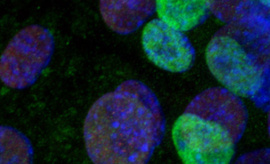Plasticity in Dnmt3L-dependent and -independent modes of de novo methylation in the developing mouse embryo
A stimulatory DNA methyltransferase co-factor, Dnmt3L, has evolved in mammals to assist the process of de novo methylation, as genetically demonstrated in the germline. The function of Dnmt3L in the early embryo remains unresolved. By combining developmental and genetic approaches, we find that mouse embryos begin development with a maternal store of Dnmt3L, which is rapidly degraded and does not participate in embryonic de novo methylation. A zygotic-specific promoter of Dnmt3l is activated following gametic methylation loss and the potential recruitment of pluripotency factors just before implantation. Importantly, we find that zygotic Dnmt3L deficiency slows down the rate of de novo methylation in the embryo by affecting methylation density at some, but not all, genomic sequences. Dnmt3L is not strictly required, however, as methylation patterns are eventually established in its absence, in the context of increased Dnmt3A protein availability. This study proves that the postimplantation embryo is more plastic than the germline in terms of DNA methylation mechanistic choices and, importantly, that de novo methylation can be achieved in vivo without Dnmt3L.



